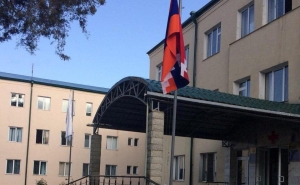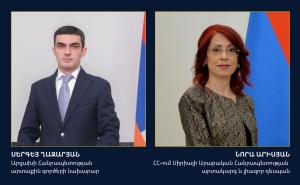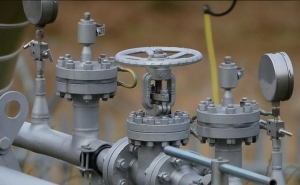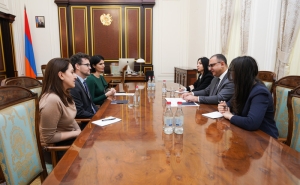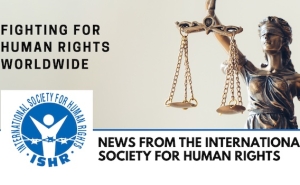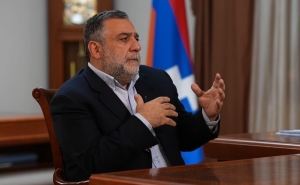 Karabakh Conflict Negotiation Process.: Year Review
Karabakh Conflict Negotiation Process.: Year Review
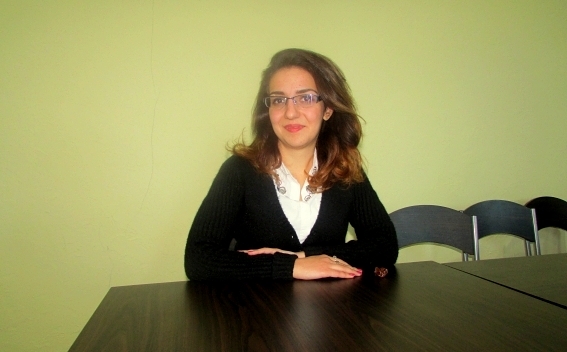
2015 in regard with Karabakh conflict settlement can be considered ineffective and the situation on the borders – worrying.
The tensions on the borders that started from January 2015, continued throughout the year, and in the middle of the year Azerbaijan started using heavy weapons, tanks as well. Only during January Armenia, Nagorno-Karabakh Republic and Azerbaijan had 12 victims and 18 wounded, which was unprecedented as compared to other years.
Mutual accusations and Azerbaijan’s war rhetoric were not becoming milder. Besides, in 2015 we once again witnessed which side provoked border incidents. During the European Games held in Azerbaijan the situation on the borders was calm, but after the Games, when there was no need to show the international society how stable and peaceful country Azerbaijan is, it continued firing even tenser. During the plenary monitoring of the borders by the OSCE Minsk Group co-chairs held on October 26-28 shootings were heard from the Azerbaijani side. However, even after that incident the co-chairs remained faithful to their "we are not judges" principle and no addressed accusations were heard.
As the RA Defense Minister Artsrun Hovhannisyan mentioned in the press-conference, that from now on "it is not appropriate to talk about ceasefire violations, it is war."
As for the work of the OSCE MG co-chairs, from the beginning of 2015 they were trying to organize a meeting of the Armenian and Azerbaijani presidents, but these efforts succeeded only at the end of the year – on December 19, which, however, did not record any results.
During the past year, to promote the negotiation process, the co-chairs again tried to put into circulation the idea of "constructive negotiations," which, however, was not used in the negotiation process that is now in deadlock.
In their statements during the whole year the co-chairs called the sides to restrain from intensifying border tensions and come to an agreement over confidence building measures. As one of those measures the importance of exchange of information on missing persons because of war was mentioned. This was fulfilled with the mediation of ICRC, but the confidence between the sides did not become more. Another confidence building measure that was being talked about, was the establishment of investigation mechanisms, around which the sides could not come to an agreement.
During the whole year the efforts of the co-chairs to make the sides come to an agreement on different issues clashed with the lack of Azerbaijan’s political will on peaceful settlement of the conflict. Azerbaijan’s this kind of behavior even made the co-chairs, who used to keep an artificial balance in their statements, say that Armenia has given its consent on investigation mechanisms, whereas Azerbaijan – not.
In parallel, during the whole year the co-chairs were stressing the importance of contacts between societies. This was first of all directed towards Azerbaijan, which does not spare any efforts to hinder the contacts between Azerbaijanis and Armenians.
In the negotiation process and in the statements of the co-chairs another new element was also recorded – the justification of effectiveness of the OSCE MG format and the fact of its being acceptable. This was particularly conditioned by the policy of Azerbaijan to move the problem to other platforms – another destructive step by Azerbaijan to hinder the peaceful process of settlement. Particularly in the fall of 2015 the PACE Committee on Political Affairs and Democracy and Committee on Social Affairs, Health and Sustainable Development adopted two anti-Armenian reports "Escalation of violence in Nagorno-Karabakh and the other occupied territories of Azerbaijan" and "Intentional Deprivation of Residents of Azerbaijani Border Areas of Drinking Water" respectively, which in the form of draft resolutions will be discussed during the PACE Winter Session to be held in January of this year.
These draft resolutions, being obviously partial and presenting exclusively the approaches of the Azerbaijani side aim at distracting the attention of both the sides and the mediators from the negotiation process. As a result, soldiers and peaceful people continue being killed on the borders. The co-chairs had to respond to these draft resolutions and announce that such steps harm the negotiation process and can have no positive results on the settlement process.
The announcement of the Prime Minister of Turkey Ahmed Davutoglu on the background of Turkish-Russian tense relations that "Turkey will do everything possible to liberate the occupied territories of Azerbaijan" was added to the impunity of Azerbaijan.
This situation and the policy of Azerbaijan does not give much optimist for 2016. In such a situation to restore trust between the sides and to bring the them back to substantive discussions, signing a new three-sided agreement on non-use of force would be the most logical one. Together with that the international community, including the mediators and the authors of pro-Azerbaijani reports and resolutions should acknowledge that with such steps they support Azerbaijan’s war rhetoric and destructive policy and share the responsibility for the shed blood of every soldier and citizen killed on the borders.
Other materials on this subject
- Russian forces have clearly failed in their duties: senators press Biden Administration to break Azerbaijan’s blockade The United States cannot stand aside while the Aliyev regime callously threatens the lives of Nagorno-Karabakh’s citizens, and must hold Azerbaijan to account for blocking a civilian population’s access...
- US calls for the full restoration of free movement through the Lachin Corridor "We remain concerned about impeded access to the Lachin Corridor and the humanitarian implications of this situation. This sets back the peace process and undermines international confidence. We call for...
- Azerbaijani forces violate the ceasefire in Artsakh The ceasefire violation was reported to the command of the Russian peacekeeping troops.
- Azerbaijani units violate ceasefire in several directions, Artsakh’s Defense Ministry says The Armenian side has no losses. The incidents of ceasefire violations were reported to the command of the Russian peacekeeping troops.
- Russian Diplomat Reassures Armenians Over Corridor In Karabakh "The parties are in direct contact, and I assure you that the peacekeepers will not move a single centimeter until there is a new corridor," Seleznyov said.
Other materials on this subject
- The Old New Year The Orthodox New Year has been symbolized or mentioned in various Eastern European art, including Russian art and literary works.
- How to Make a Glint-wine? Cheer Up Yourself with This Warm Delicious Beverage The secret to getting a great Glühwein is the right mixture of red wine, cinnamon sticks, sugar, oranges and cloves. Follow this simple recipe to conjure up a touch of winter magic in your own kitchen.
- Happy New Year, Dear "Armedia" IAA Readers! We wish a year without war, a year of stability, a year of progress and development.
- Cumberbatch Leads a Masterclass How to Accept Bad Presents Benedict Cumberbatch leads an acting Masterclass to teach you how to act like you ‘love love’ the long underwear your auntie gave you!
- If You Want to Spend Eco-New Year, Visit Artsakh So if one wants to spend an unforgettable time at New Year, it is highly recommended to visit Artsakh! This will be the most eco-New Year in your life!
-
 17:08
17:08The regular session of the Anti-corruption Policy Council takes place in Jermuk
-
 15:05
15:05The Prime Minister sends congratulatory messages to the supreme leader of Iran and the President of Iran
-
 11:11
11:11Armenia sends earthquake aid to Turkey
-
 10:43
10:43Commemoration of the Pontiff St. Sahak Partev
-
 09:16
09:16Some roads are closed and difficult to pass in Armenia
-
 19:55
19:55Phone conversation of the Foreign Minister of Armenia with the U.S. Assistant Secretary of State for European and Eurasian Affairs
-
 18:30
18:30Prime Minister Pashinyan and President Khachaturyan meet
-
 18:20
18:20Ararat Mirzoyan with Co-Chairman of the OSCE Minsk Group of France Brice Roquefeuil
-
 17:01
17:01Humans could land on Mars within 10 years, Musk predicts
-
 16:45
16:45France, US urge 'immediate' end to Nagorno Karabakh blockade
-
 16:01
16:01Blockaded Nagorno Karabakh launches fundraiser to support quake-hit Syria
-
 15:59
15:59Earthquake death toll in Turkey rises to 18,342
-
 15:43
15:43Ararat Mirzoyan Held a Telephone Conversation with Sergey Lavrov
-
 15:06
15:06French president rules out fighter jet supplies to Ukraine in near future
-
 14:47
14:475 Day Weather Forecast in Armenia
-
 14:44
14:44President Vahagn Khachaturyan wrote a note in the book of condolences opened in the Embassy of Syria in Armenia
-
 14:20
14:20Azerbaijan’s provocations impede establishment of peace and stability – Armenian FM tells Russian Co-Chair of OSCE MG
-
 12:57
12:57France representation to OSCE: Paris calls on Azerbaijan to restore freedom of movement through Lachin corridor
-
 11:40
11:40Command of Kosovo forces highly appreciated preparation of Armenian peacekeepers
-
 10:16
10:16The United States withdrew from sanctions against Syria for six months the provision of assistance after the earthquake
day
week
month
Humidity: %
Wind: km/h



